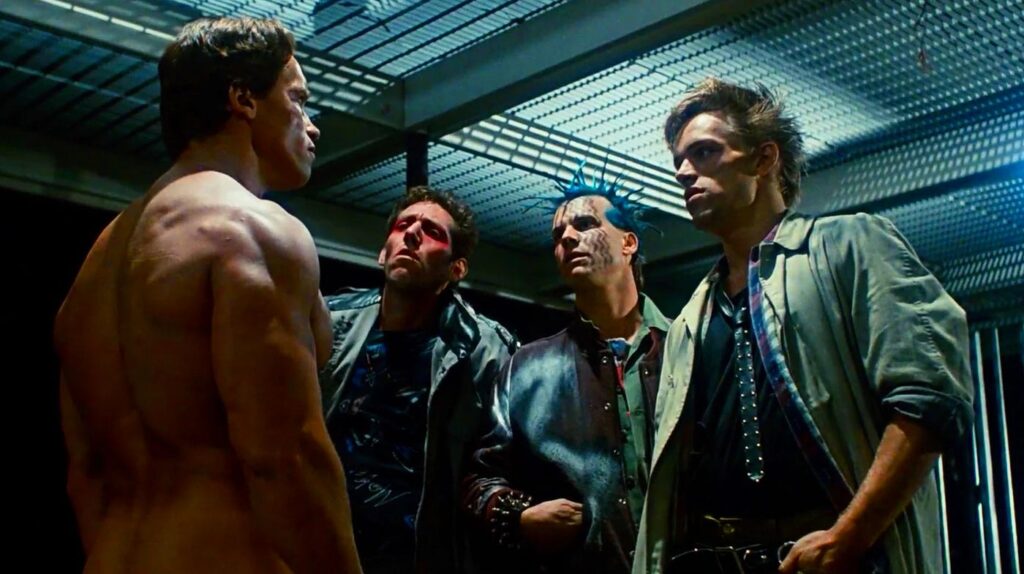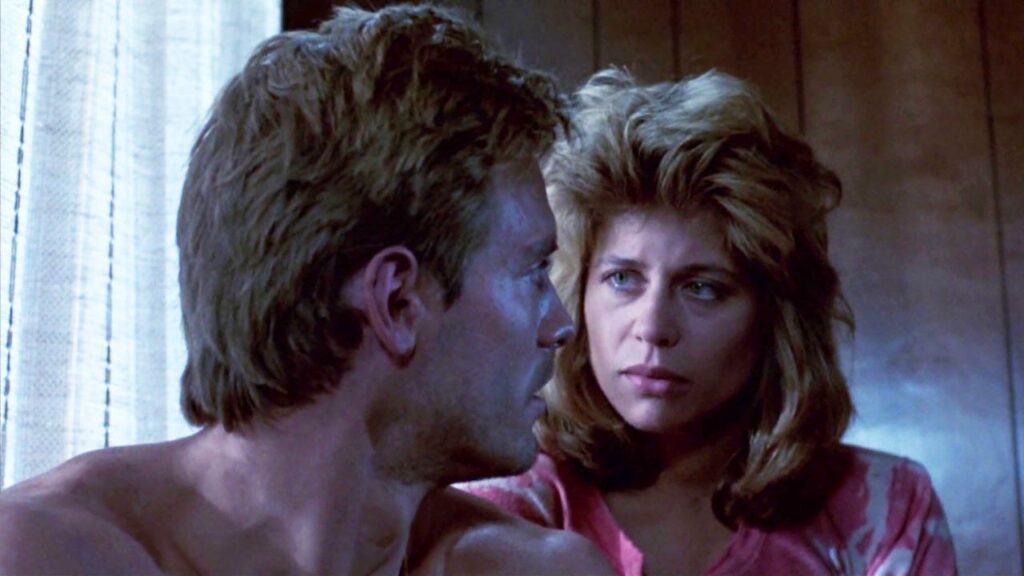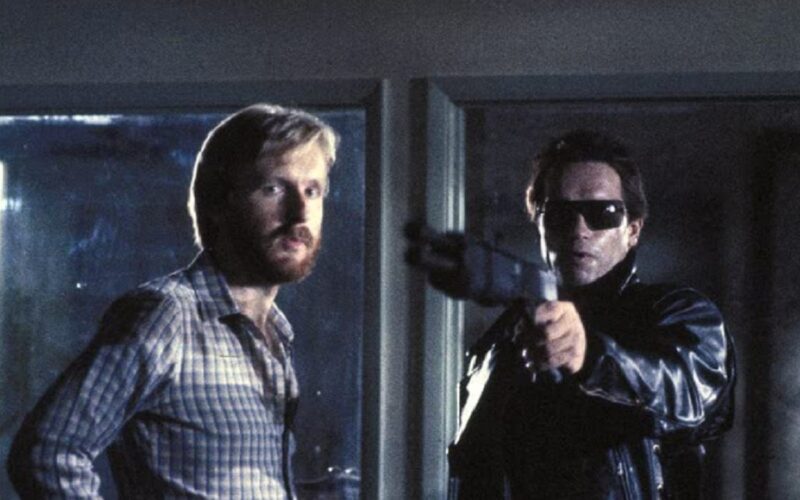It not only launched the careers of Cameron and Arnold Schwarzenegger but also spawned one of the most enduring franchises in cinema history.
As we look back on the 40th anniversary of The Terminator, it’s clear that its legacy is still as powerful and relevant as ever. From its iconic one-liners to its groundbreaking special effects, The Terminator remains a touchstone in the world of science fiction and action films.
A New Kind of Sci-Fi Hero
In 1984, science fiction was largely dominated by films like Star Wars and E.T., movies that focused on space opera adventure or heartwarming alien encounters. The Terminator, however, took a darker, grittier approach to the genre. James Cameron’s vision was a dystopian future ruled by machines, where a seemingly unstoppable assassin from the future, played with cold precision by Arnold Schwarzenegger, is sent back in time to kill Sarah Connor (Linda Hamilton), an ordinary woman who would one day give birth to the leader of the human resistance.
At the time, Schwarzenegger wasn’t yet the household name he would become. His role as the T-800 Terminator, however, solidified him as an action icon. His robotic, emotionless performance, combined with his imposing physical presence, made the Terminator one of the most fearsome villains ever seen on screen. Schwarzenegger’s line, “I’ll be back,” became an instant classic, delivering one of the most memorable moments in movie history. It’s a testament to Cameron’s knack for writing not just thrilling action scenes, but also quotable dialogue that stands the test of time.

The Birth of a Franchise
The Terminator wasn’t just a one-off success; it was the beginning of one of the most beloved sci-fi franchises of all time. What started as a modest film with a budget of only $6.4 million eventually grew into a sprawling saga that would span decades, encompassing films, TV shows, comic books, and video games. But it all started with Cameron’s tightly crafted original, which combined gritty realism with futuristic tech in a way that felt both accessible and terrifying.
The film’s central premise, involving time travel and the eventual rise of Skynet, a sentient AI bent on exterminating humanity, resonated with audiences then and remains eerily relevant today. The looming fear of technology gone wrong is something we still grapple with in the age of AI and automation. In this way, The Terminator continues to feel ahead of its time, predicting a future where humans’ overreliance on machines leads to catastrophe.
Special Effects that Redefined the Genre
Though The Terminator was made on a modest budget, the film’s special effects were revolutionary for the time. Stan Winston’s animatronics and Cameron’s use of stop-motion brought the T-800 endoskeleton to life in a way that had never been seen before. The combination of practical effects and miniatures gave the film a grounded, gritty feel, setting it apart from the more polished blockbusters of the era.
Cameron’s background in special effects (he’d previously worked on Piranha II: The Spawning and Escape from New York) allowed him to push the boundaries of what could be achieved with limited resources. The T-800’s gradual reveal – from a human-like Schwarzenegger to the terrifying skeletal robot beneath – was a masterstroke of suspense and visual storytelling.
What Cameron accomplished with The Terminator paved the way for the stunning visual effects that would become a hallmark of his later films, including Aliens and Terminator 2: Judgment Day. The latter, released in 1991, would take the groundbreaking work of the original and amplify it, cementing the franchise’s place in sci-fi history.

The Themes of Fate and Humanity
At its core, The Terminator is not just an action movie, but a meditation on fate, free will, and what it means to be human. Sarah Connor, brilliantly portrayed by Linda Hamilton, starts out as an ordinary waitress but is thrust into a nightmare where she must not only survive but also come to terms with her role in humanity’s future. The idea that she, a seemingly insignificant person, is the key to the survival of the human race resonates deeply, especially in a world increasingly dominated by forces outside our control.
The film’s central theme – that the future is not set, and that humanity’s survival depends on its ability to fight back against insurmountable odds – speaks to a broader fear of losing agency in the face of unstoppable technological progress. Cameron would explore these themes more deeply in the sequel, but The Terminator laid the groundwork for the philosophical questions that would come to define the series.
A Lasting Impact on Action and Sci-Fi
Forty years later, The Terminator’s influence on the sci-fi and action genres is undeniable. Its lean, high-stakes storytelling, combined with groundbreaking effects, made it a template for countless films to follow. The notion of a near-indestructible villain has become a staple of action cinema, but few films have managed to match the raw intensity of Cameron’s original.
Moreover, The Terminator launched James Cameron’s career, marking the beginning of a journey that would see him direct some of the most successful and innovative films of all time, including Titanic and Avatar. His dedication to pushing the boundaries of technology and storytelling can be traced back to the gritty ambition of The Terminator.
Celebrating 40 Years of a Classic
As we celebrate the 40th anniversary of The Terminator, it’s remarkable how well the film holds up. It remains as thrilling, thought-provoking, and visually stunning as it was in 1984. Its themes of technology, fate, and survival resonate just as strongly in today’s world, and its legacy continues to inspire filmmakers and audiences alike.
In the decades since its release, The Terminator has become more than just a movie; it’s a cultural touchstone, a reminder of the power of innovation, and a testament to the enduring appeal of a great story. Forty years on, the Terminator’s promise – “I’ll be back” – rings true, as the film continues to find new audiences and maintain its place as one of the greatest sci-fi action films of all time.








